Disclosure: Meeple Mountain received a free copy of this product in exchange for an honest, unbiased review. This review is not intended to be an endorsement.
I don’t want to get too personal here, but…I love booze.
I have a handsome home bar, purchased pre-pandemic, and that bar got a LOT of work for the first six months of COVID. (Parenting, early pandemic? Nightmare.) By the time restrictions began to lift, I was whipping up high-end cocktails two or three times a week in the evenings after the kids went down.
Recipe books started to pile up: The Bartender’s Bible (over a thousand recipes!), 3-Ingredient Cocktails, Bourbon Curious, Smuggler’s Cove. I’ve got books now for almost every base spirit. Subscription to Imbibe? Check. Purchase of high-end glassware? Absolutely. Monthly trips to Binny’s, the nation’s best liquor store chain?
Obviously.
During the same window of time, I began my tabletop writing career here at Meeple Mountain. One of the few things I love more than mixing spirits is playing games with friends and family.
Distilled (2023, Paverson Games) hit all the right timing notes when it arrived at my door. I love games. I love drinks. I love high-end production. I love midweight games. I love diverse depictions of in-game characters.
In fact, I am ready to say that Distilled was my most anticipated game of 2023. The hype for me began when I met the designer and owner of Paverson Games, Dave Beck, at GAMA Expo 2022. He’s a fun guy. We had a great conversation at GAMA and at a couple other conventions last year. The anticipation for Distilled has been building for a while.
In many ways, Distilled delivers.
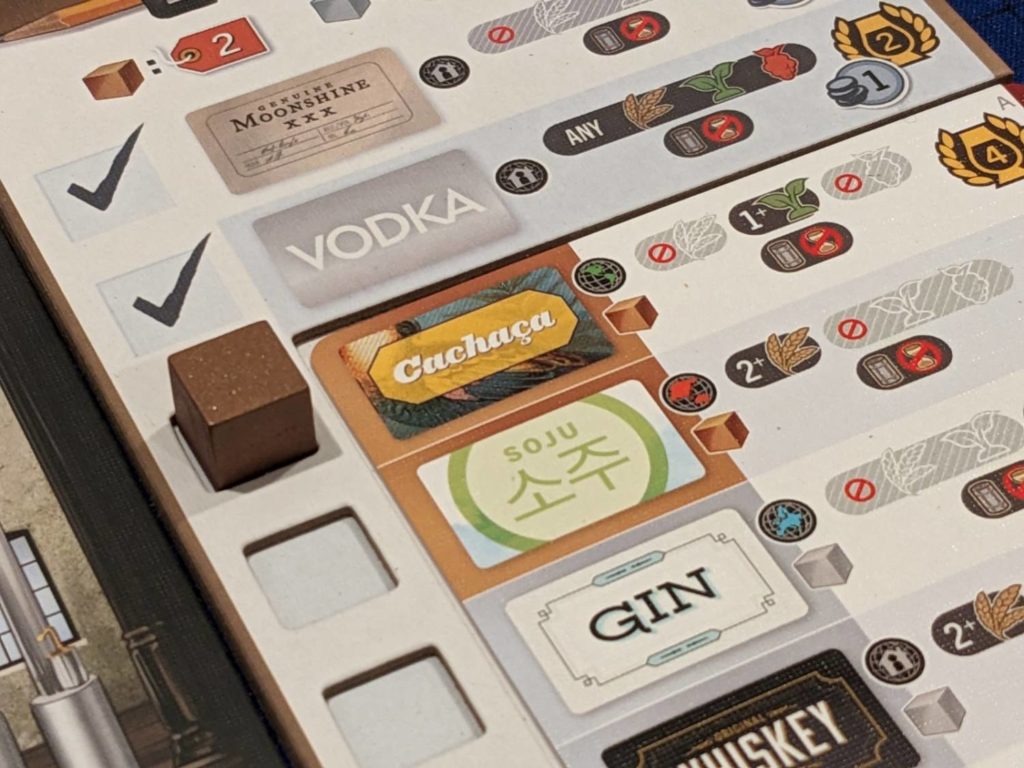
Can I Borrow a Buck?
Distilled puts players in the shoes of distillery owners looking to sell spirits, make a few bucks, and score more Spirit Points (SPs) than the competition.
Over seven rounds, players take very simple actions by buying cards from both a premium and/or basic marketplace, then simultaneously distilling spirits before selling and/or aging their swill to earn money and SPs. Public milestones force players to race for additional SPs, while each player can score up to two private goal cards to pile on the points.
At its core, Distilled is a basic Euro-style gaming experience. Variable player powers are assigned to each player in the form of their distillery owner, a mix of characters that grant a very minor power for the entire game. A shifting card market means that each game is a little different, with barrels, specialist cards, ingredients, and distillery upgrades available for a range of prices.
But there is very little interaction in the game, making each experience a race to distill different (and limited) spirits before other players can complete their recipes. The distilling experience may break this game for some players.
Each player gets to make one batch per round during the distill phase. Players add yeast, water, and sugar cards to the “Washback” area of their board, then shuffle those cards. Then, they remove the top and bottom card, and voila, you’ve got something that could be barreled: maybe a shochu, maybe a tequila, maybe a whiskey. Each tasting flight—a recipe list, chosen during setup for all players—has a list of seven potential recipes, and players can only distill the recipes they have unlocked.
However, all players can make moonshine or vodka right out of the box. So, even if you don’t make the recipe you want during the distill phase, you’ll still always make something. (Normally, your goal should be to NOT make moonshine or vodka, since those recipes score you almost no points.) This will turn off some people—specifically, strategy gamers—expecting the recipe fulfillment elements of distilling spirits to be more deterministic.
As it is, some rounds come down to this: you’ll buy a bunch of stuff, shuffle up the cards you want to use in the recipe, then pull out the top and bottom card, and voila, you’ve got your spirit. If you only had enough money to hope for the best, you might get hosed. I had a game where I got hosed on three different turns, ending up with vodka each time. In that game—a game where I produced vodka four times—I lost by 40 points despite doing a decent job of trying to mitigate a bad card draw.
The other thing that might turn off some players: money. That’s because, for at least a round or two (and maybe more if you aren’t able to generate a handsome product), you aren’t going to have any cash.
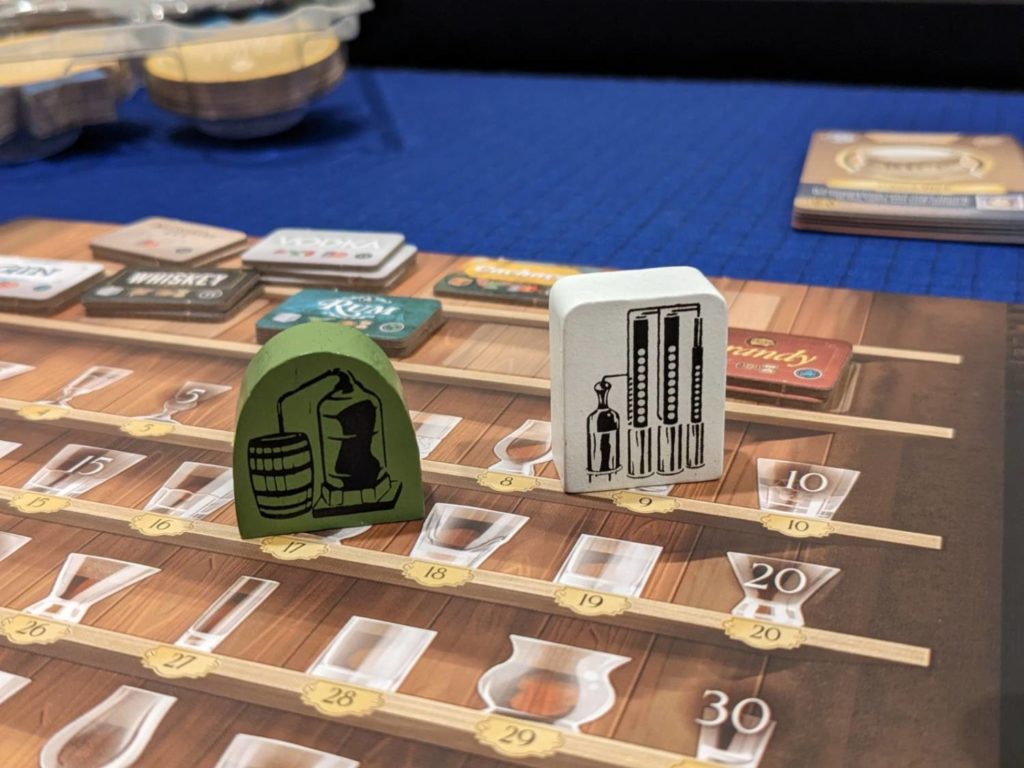
So Tight
On a scale of one to Pipeline (the game I still place as #1 on my “I can’t believe I still don’t have any money” list), the first three rounds of Distilled would probably rate as a 9.
Distilled gives players a choice of two different distillery owners, from a pool of about ten, depending on the pre-game setup. Each distillery owner offers an ongoing power and slightly different starting resources.
Usually, you will begin the game with two or three bucks. Then you look at what you need to spend to do anything of value. It costs $2 to unlock the lowest-level recipes on your board. It costs $3-$7 to buy most of the cards from the market; in each of my plays, any time someone sees a $1 or $2 card in the market, they snatch it up on their turn.
Even the basic ingredients and basic items cost more than I would have guessed given how tight cash is. Water and yeast are free, with yeast granting the buyer a buck. But after you buy anything beyond water, yeast, and mixed grains, you are gonna spend money.
Money is so tight in the early game here that I found it a little too punishing, sucking some of the fun out of the proceedings. In my first two-player game of Distilled, it felt like I had maybe $3 for three of the first four rounds. (Selling booze provides that player with a “Spirit Label” that can be used to take a bonus from the top of each player board. In almost every game with almost every player, the first bonus players take gives them $5.)
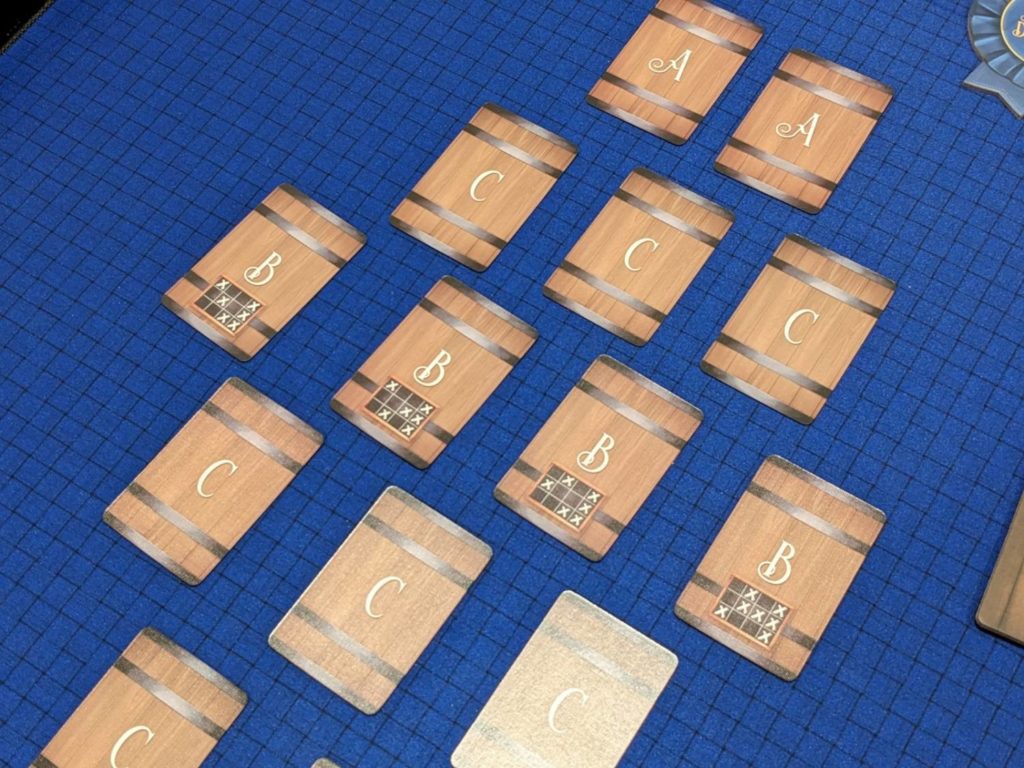
Then, things totally flip over, particularly for a player that sells a fancier spirit after aging it in their warehouse. I have found that in rounds six and seven, sometimes players have so much money they can’t spend it all.
A few other issues. The only thing about Distilled that feels broken is the round structure. Seven rounds is too many, particularly when the player count is high. But more importantly, in a seven-round game with five players, two players get the advantage of going first twice in each game. This feels off, particularly because having the first choice of a fresh market of cards can be vital.
The issue with being the first player becomes more pronounced late in the game, when the spirit labels are almost gone. The first player gets the chance to distill a spirit first; if there’s only one whiskey label left but multiple players made it, that might be the difference between two points (or more) for the first player. Sometimes the public milestones are tied to accomplishing goals that can only be done with spirit labels; going first helps here too.
Also—and this is purely a guess based on my plays, so take this with a grain of salt—the distillery owner cards feel unbalanced. One of the characters begins play with $3 and a silver recipe cube to make whiskey (value: $4)…AND they have an ongoing power. Each distillery owner has a “signature spirit”; some of those spirits score 8 points, but others score double that. Some powers seem situationally better for an entire game, whereas others feel good only when a specific scenario pops up.
I haven’t played Distilled 50 times, so I will never know if this imbalance between the distillery owner cards is real or imagined. But, it feels off. Starting money is really important in Distilled, since this gives you a chance to possibly buy an upgrade card from the market in round one, which grants an ongoing power all game, which then snowballs from there.

But, the Production Values!!
Now here’s why I recommend Distilled: it’s one of the best productions with one of the most thematic gameplay experiences of the year.
That starts as soon as you open the box. Greeted by a full stack of Game Trayz (and who doesn’t love Game Trayz??), everything stays incredibly well organized in the box. There’s also plenty of room in the box for expansion content, which feels inevitable.
The rulebooks? Fantastic. There’s the normal instruction manual but also a “First Taste” walkthrough for new players who want something a bit more to guide a first play. The player aids are my second-favorite aids, just behind Hegemony: Lead Your Class to Victory. Most players will watch an instruction video, or read the rules just once, and be off and running during their first game.
I was given a copy of the retail version of the game, so while I don’t have fancy metal coins or a metal first-player marker, everything else here is top notch. The cards have a nice feel (is that a linen finish?) and the other components, particularly the thick cardboard player mats and spirit label tokens, all work well.
Love the artwork on the cards, including the diverse character upgrade cards available to purchase in the market. The backstory for the distillery owners also provided my group with a few laughs as they slipped into character. The mix of spirits in the game is also a win.
The game’s crowdfunding campaign even resulted in six background music themes that can be played from the Tabletop Audio website, if you want to sound like you are drinking in a warehouse or in a tropical location.
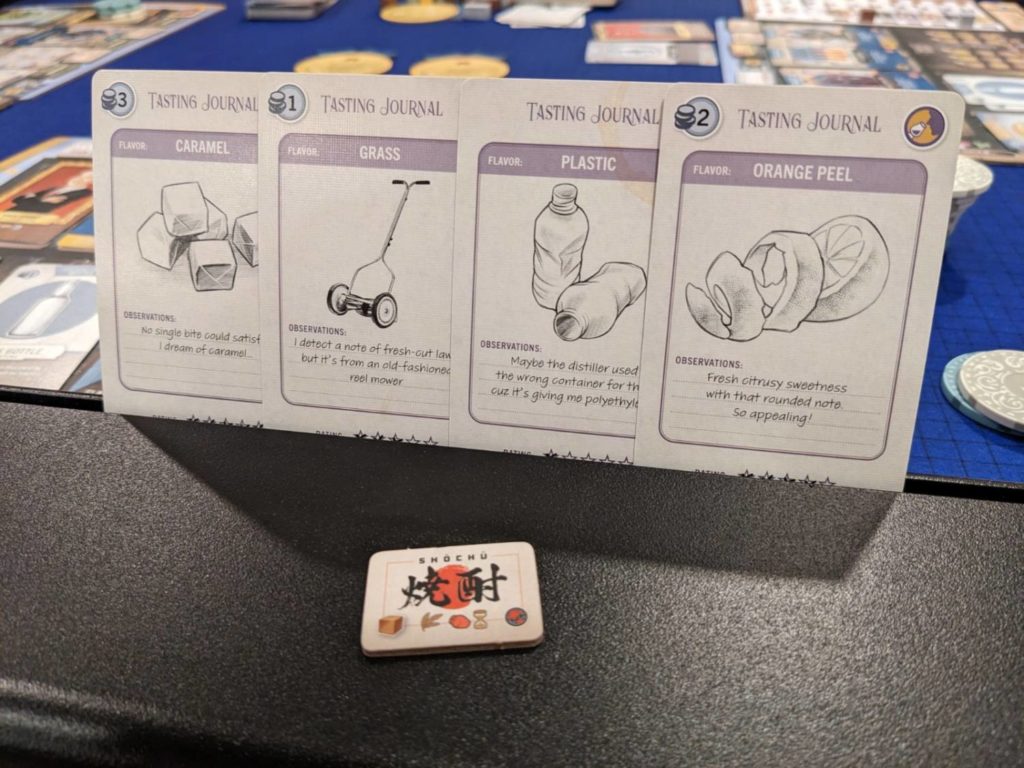
A Good Start, But I Wanted More
Distilled is Dave Beck’s first major design, and it’s an above-average game cemented by excellent theme, digestible rules, and solid production. It doesn’t do anything an experienced gamer hasn’t already seen before, but I think the game will land well with newer gamers. In fact, Distilled is one of the better “gateway” games I have played in some time.
I’m a fan of the Ben Rosset game Brewcrafters; Distilled hits many of the same notes. Fans of Viticulture and Vinhos: Deluxe Edition will also enjoy the theme here, but Distilled has a few more elements of luck and randomness built into its design, which will turn off strategic gamers looking for something comparable.
Beyond the minor issues I have already discussed, there’s one more caveat I need to mention: the playtime. Distilled is a two-player game, maybe a three-player game with quicker players. (I tried the solo, but it’s not a reason to buy the game on its own.) I steadily found games to take 30-40 minutes per player, a number that I’m sure would decrease with increased experience.
However, Distilled accommodates up to five players. That means that for your first four- or five-player game, you are looking at possibly a three-hour experience. For my final review play, I tried Distilled at five players, with three of the five players being experienced Distilled players. That game took two hours and 45 minutes.
That is simply too long for a game of this weight. No one is doing anything of value between turns except waiting to see what cards will be available in the market. One friend of mine who backed the crowdfunding campaign reported that his first five-player game (all new players for their learning game) took FOUR HOURS.
Lots of things during the market phase slow play down. Reading all of the tiny card text takes a bit. Sometimes, players have the ability to buy cards from the discard pile, which means they then have to search the discard pile; that takes time. Rounds can sometimes be quick, as each player takes only 2-3 actions. Later in the game, when players have money, everyone might get four or five actions.
It’s a lot. Stick to two or three players and I think you’ll hit the sweet spot. I can already tell Distilled will be a great game for couples looking to have a cocktail night with games, since the game might only take an hour after just a couple plays.
Distilled is fun. I wanted it to be legendary, but I can live with it just being good. Now, if you’ll excuse me, my wife is wondering when that second round of old fashioneds will be ready!


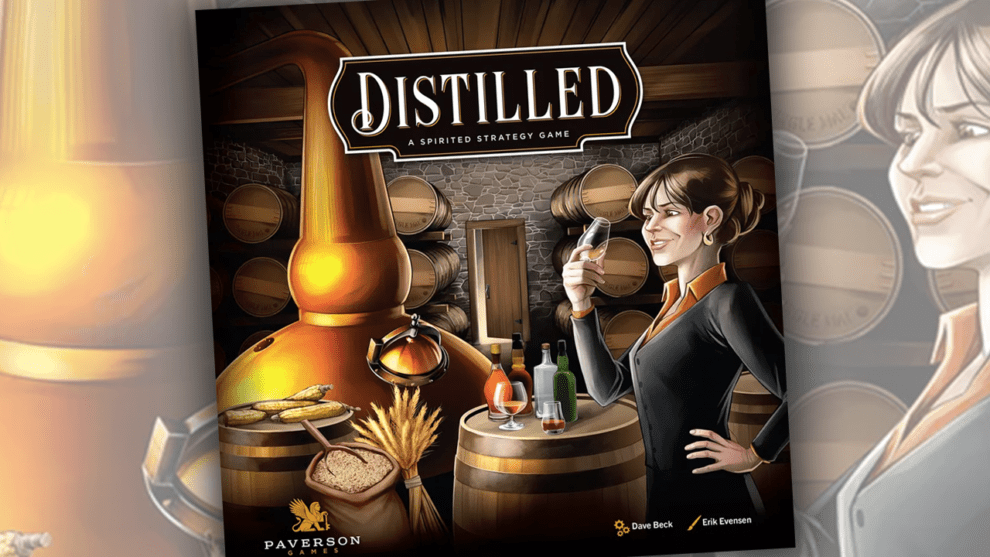

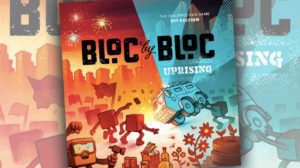
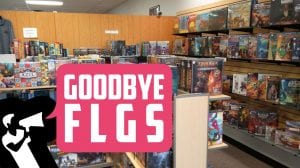
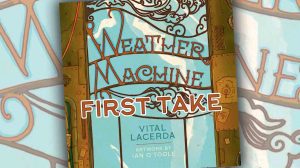
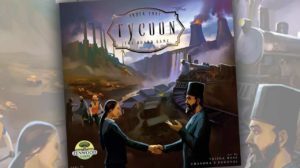




Oh boy. Like you, I got into making cocktails at home during covid. One day I hope to have my own home bar. As soon as I discovered this game I preordered it (the Kickstarter campaign had already finished, and copies were on their way to retail stores).
I’m a sucker for a good theme and production value, that’s why I backed three Kickstarters (deluxe editions!). But all three of those games were meh to not fun for me. So now I’m debating whether to keep or cancel my preorder. I wouldn’t want it to become just another pretty game on my shelf…